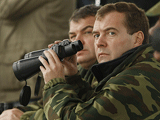Strategic Contradictions in Moscow
By Sergei Blagov for ISN
Russian President Dmitry Medvedev on 5 February formally approved the country’s new military doctrine and the nuclear deterrence blueprint until 2020, concluding that NATO’s illegitimate attempts to assume global powers, the bloc's expansion toward Russian borders and the deployment of missile defense facilities threaten Russia's security and represent "military dangers."
NATO still poses a "serious threat," the Russian Security Council's secretary Nikolai Patrushev announced on 9 February. The statement was made ahead of a meeting that same day between Russian President Dmitry Medvedev and the visiting special NATO committee (also referred to as the "Group of Wise Men" by some), headed by Madeleine Albright.
International security institutions do not guarantee equal security for all states, the doctrine states, and as such, Russia retains the right to use nuclear weapons in response to a nuclear strike or non-nuclear aggression against Russia and its allies. In its military build up, Russia would prioritize development of the system of aerial and space defense, according to the doctrine.
Russia's military policy is aimed at forestalling an arms race and preventing military conflicts, notably nuclear confrontation. It also prioritizes conventional and strategic arms control agreements, including missile defense control and space non-deployment treaty, as means to prevent conflicts.
Predictably, NATO leaders quickly dismissed the doctrine as detached from "the real world," and insisted that "NATO is not an enemy of Russia."
The doctrine was previously expected to be adopted in September 2009 but its approval was delayed, apparently awaiting a new arms reduction treaty to replace the Strategic Arms Reduction Treaty (START-1), which expired on 5 December 2009.
In early February, Russian officials said a new arms reduction treaty to replace START-1 was "95 percent" ready and pledged to reach an agreement with Washington in March or April. On 2 February, Medvedev reiterated that Russia was prepared to do "everything necessary" to work out the agreement. Yet despite optimistic pronouncements, both sides have struggled to negotiate a successor pact to the START-1, ostensibly due to Russian insistence that nuclear reductions and US missile defense plans are linked.
Russia has been wary of being increasingly cornered by the West, and officials have argued that the country should be prepared to use nuclear weapons to defend itself. In March 2009, Medvedev said that Russia would begin a “large-scale rearming” in 2011, including its nuclear arsenal, in response to the perceived NATO threat, now officially recognized in Russia's new military doctrine.
In apparent contrast with strongly worded provisions of the military doctrine, on 9 February, Medvedev voiced more optimism about relations with the West. Following a meeting in Moscow with Felipe Gonzalez, who chairs the EU group of ‘wise men,’ Medvedev described Europe as an "important partner."
But earlier this month, Russian officials dismissed suggestions by their European counterparts that Moscow move nuclear weapons away from EU borders. In response, Moscow suggested that US nuclear arms be removed from Europe.
Indeed, the Kremlin's worldview still seems to include conflicting elements, as Russian officials waver between calling the same states ‘threats’ and ‘partners’ – a confusing strategy that is not certain of serving and safeguarding Russia’s long-term security. But certainly, it keeps everyone on their toes.

